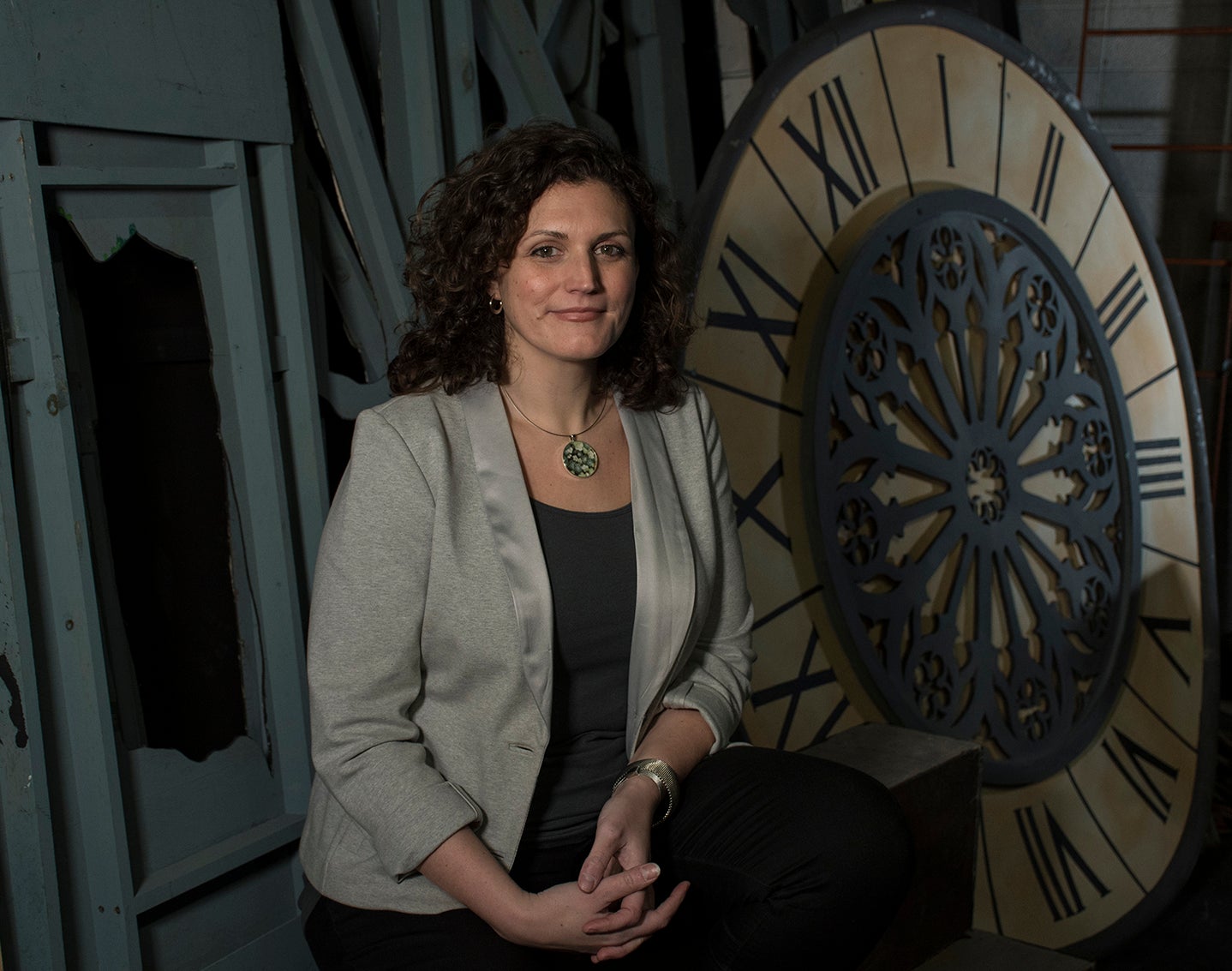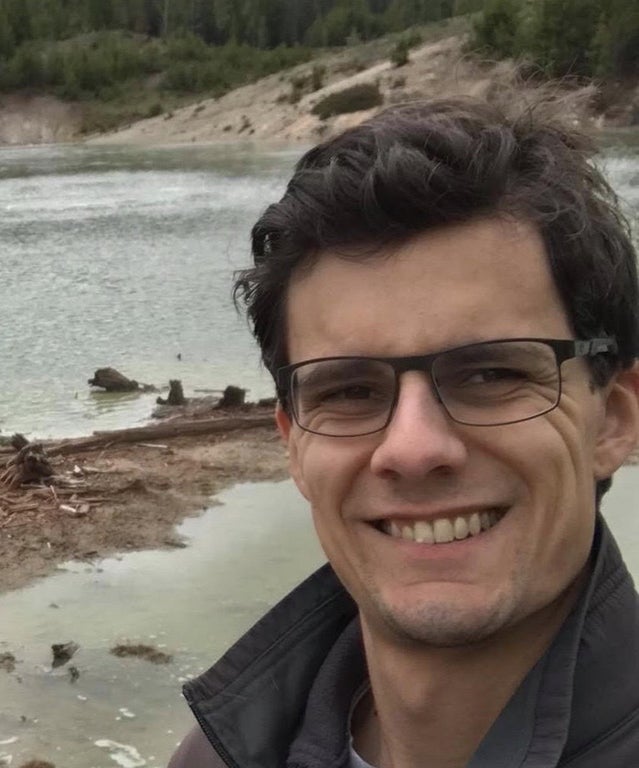Part 1 runs from now through November 5
By Tony LaRoche
 |
| Rachel Walshe. URI Photo by Nora Lewis |
For one,
the play’s large ensemble cast featured University of Rhode Island alumnus
Andrew Burnap, who would win one of the play’s three Tony Awards. And Walshe
and fellow URI colleagues were in the audience for the play’s last performance
on Broadway before it closed because of the COVID-19 pandemic.
“We were
watching the play when we all got the notice the world was shutting down,” says
Walshe. “At the time, I didn’t realize I was sitting in the last production.”
 |
| James Horban |
Walshe
and fellow URI Theatre Professor James Horban have spent much of the summer
helping Trinity Repertory Company prepare to bring the mammoth, two-part drama
to life. “The Inheritance” opened Sept. 1 at the Providence theatre, one the
most respected regional theatres in the country. Under Trinity director Joe
Wilson Jr., Walshe has served as the production dramaturge and Horban as
lighting designer.
“I
obviously care deeply about the play and I was excited to collaborate with Joe
again,” says Walshe, who served the same role for Wilson last season at the
Gamm Theatre in Warwick as he directed “An Octeroon.” “It was a perfect fit.”
Horban
joined the Trinity creative team thanks to Walshe, who recommended him to Wilson.
Horban and Wilson’s first talk – one of weekly Zoom check-ins this summer – was
a two-hour conversation of how the play resonated with them, more than a
discussion about lighting.
“I think that’s what is interesting with this script. We have so many people coming together where their individual histories are connecting with these characters,” Horban says. “The characters are written in such a deep way. They have such beautiful arcs that you connect with multiple people on multiple levels.”
Horban, who
was working on lighting rigs for 80,000-person arena concerts by the time he
was 18, has done larger shows. But he’s found “The Inheritance” a challenge in
its own way. “It’s very daunting,” he says, “and it’s a lot of paperwork.”
The play,
which runs a total of seven and half hours over two parts, has more than 100
scenes. As part of the design process, Horban broke down each scene –
understanding what it’s saying to the audience and considering the setting and
time of day – to figure out what lights were needed. To keep track of this, he
drew up a spreadsheet of where each light is placed and a cue list for when
each is used. The plan must also be flexible enough to serve each part of the
play.
The
design also must help convey the charisma of the story, and its ebb and flow.
“We knew that with the power of the text we wanted to have these moments of
grounded reality,” says Horban, “but be able to go into these hyper-theatrical,
emotional moments with lights to support the rises and the falls of that story.”
Meanwhile,
Walshe has been turning on lights in a different way.
The job
of a dramaturge is to help the director and creative team put on the best play
possible. To do that, Walshe sheds light on the play itself – researching the
playwright and his or her motivations for writing it and, among other things,
the play’s production history, the world it creates, even understanding the
director’s interpretation of the work. In rehearsals, she thinks of herself as
the “ever-present audience member,” making sure the play will not be confusing
to the audience.
“I love
stories. I love telling stories,” she says. “I love watching stories unfold and
the dramaturge is in many ways the keeper of the story and thinking about how
the story is transmitted to an audience. As an academic, I’m inherently curious
about the world and helping interesting, esoteric ideas make their way to the
audience with clarity and passion.”
For “The
Inheritance,” her work has included researching the playwright’s inspiration
for the play – E.M. Forster’s classic novel “Howards End.” That also meant a
thorough examination of Forster’s other works and the novel’s film and TV
adaptations. That helped her provide a crash course on the connections between
the characters in the “The Inheritance” and “Howards End.”
She also
researched the New York theatre group Elevator Repair Service’s production of
“Gatz,” an eight-hour theatrical reading of “The Great Gatsby” – another of
Lopez’s motivations. But perhaps most impressive: Walshe annotated “The Inheritance’s”
very long script – about 100 footnotes in all.
“The play
is in many ways a chronicle of the lives of gay men in the wake of the AIDS
crisis,” she says. “There’s a lot of social political context and details that
show up in the play. So, when something comes up that references, for example,
a medical condition or specific place that may not be obvious, I provided
resources so that anybody who’s working on the play in any capacity can say,
‘Oh, that’s what that is.’”
While
work at outside theaters is professionally and personally gratifying, it is
also required of tenure-track theatre faculty at URI. David Howard, chair of
the Theatre Department, explains the requirement as theatre’s nod to a
professor’s commitment to academic scholarship.
“If you were
in the history department or English, you would have to present at conferences,
you would write articles or books,” says Howard, a costume designer who
regularly collaborates with other theaters. “Well, this is our professional
contribution as well to do production work in professional houses. We can write
books, we can write articles. But our professional work has as much weight as
those in other areas.”
This
fall, Howard is designing costumes for “Describe the Night” – directed by URI
alumnus Tony Estrella – at the Gamm Theatre. He, Walshe and Horban see many
benefits in the faculty’s collaborations at outside theaters.
They get
to mix with artists away from the University who have their own unique
perspectives on theater. They are exposed to technologies that might be new to
them. All of which benefit them as educators, and help to provide professional
experiences to share with students and even the chance to expose students to
professional settings.
“It is my
work. That’s one of the wonderful virtues of being in a university setting. We
are here not just to teach; we’re here to build a body of research or body of
creative work. And that’s what I get to do as a professional director and
dramaturge,” says Walshe, a professor of acting and playwriting, who is
resident scholar at the Gamm. She will direct Lynn Nottage’s “Sweat,” at the
Gamm this fall with Horban as lighting designer.
“Everyone
has developed their own aesthetic and their own working practices,” adds
Horban, who joined URI in 2020 as a professor of lighting and design.
“Collaboration helps keep things vibrant and alive because your work as a
designer is inspired by other things that you see. So, being able to work with
more people only makes the community stronger.”
At
Trinity, “The Inheritance” Part 1 runs Sept. 1 to Nov. 5; Part 2 runs from
Sept. 22 to Nov. 6. For more information, go to the Trinity website.